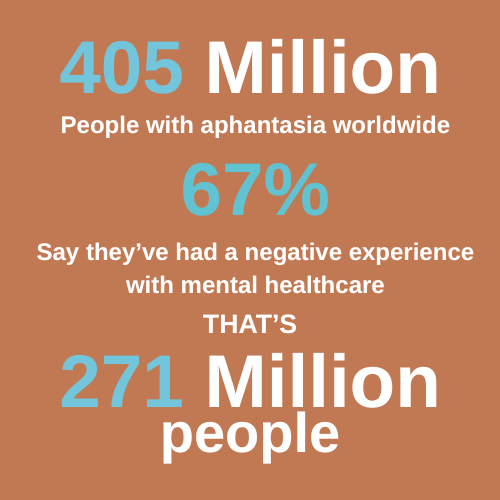Become an Aphantasia Therapist
Stop Losing Clients You Could Have Helped and Transform Your Practice
Finally understand why some clients disengage, struggle with traditional techniques, or seem 'stuck' and discover the specialised skills that turn these challenges into your greatest therapeutic successes
Transform your practice today"I've done a lot of training, since I qualified, and none have been as valuable as this one" Krissy

Could you be the therapist who provides a positive experience?
While many therapists struggle to find clients, people with aphantasia are looking to find therapists who understand them, and coming up blank. These are often misunderstood clients who need therapists who truly understand how their minds work. People who are walking away from therapy feeling like it doesn't work for them or that the professional they were working with just wasn't very good.
The Hidden Opportunity
Right now there's an opportunity for you to increase your client base by training to support clients who are searching for, but not finding, therapists and counsellors who understand them.
People with the cognitive differences are already:
- in your therapy room but could be leaving feeling unsatisfied because traditional techniques don't work for them
- having negative therapy experiences which is creating a massive gap in effective mental healthcare
- losing clients and ongoing revenue when they could become your most loyal, long-term clients
- missing out on an untapped market of up to 405 million people who could be seeking therapists who understand cognitive differences
The Staggering Market Reality
Recent searches of the UK's leading therapist directories (Sept 2025) reveal a shocking disparity that represents the biggest untapped market in mental healthcare.
The ADHD vs Aphantasia Comparison
ADHD Market (Established & Saturated):
- ADHD UK says that 3.5% of the adult population has ADHD. That's around 2.3 million people in the UK alone.
- A quick search on one of the major counselling directories identified more than 27,000 therapists who say they work with people with ADHD.
- That's 1 therapist to every 85 people.
Aphantasia Market (Virtually Untapped):
- 3.9 - 5% of the population estimated to have aphantasia.
- That's approximately 2.6 million adults in the UK.
- A search on the same directory produced 4 therapists who use they word aphantasia and one of those is an Aphantasia Academy student.
- That's 1 therapist to every 650,000 people.
What This Means for Your Practice
Aphantasia affects MORE people than ADHD yet has 9,000 times fewer specialists
If aphantasia had the same specialist ratio as ADHD, there would be 30,000+ aphantasia therapists in the UK
By taking this training, you're not entering a niche market, you're pioneering a market that should be BIGGER than ADHD therapy
First-mover advantage: Position yourself before this market explodes
The Numbers Don't Lie:
The aphantasia therapy market isn't small but the the number of therapists ready to support it is virtually none existent and that's your opportunity.
"This is invaluable and not enough people know about the topics covered" Sue
What Is Aphantasia And Why Does It Matter in Therapy?
Aphantasia is the inability to create mental imagery in the mind’s eye but for many clients, the experience goes far beyond the visual.
Multi-sensory aphantasia can include a lack of sound, sensation, smell, taste and inner verbal thought. Often co-occurring with cognitive differences such as SDAM (Severely Deficient Autobiographical Memory), anauralia (no internal sound), anendophasia (no internal verbal thought), and alexithymia (difficulty identifying or expressing emotions), this cognitive difference affects how a person processes memories, emotions, identity, trauma and change.
As a therapist, counsellor or mental health professional, recognising and adapting to these differences can transform the therapeutic relationship and unlock deeper engagement, emotional insight and long-term progress.
The Real Value of Becoming an Aphantasia Therapist
Professional Confidence
Gain the knowledge to recognise and work effectively with clients who have aphantasia, SDAM, and related cognitive differences. No more wondering "what am I missing?" with certain clients.
Expanded Client Base
Understand how to adapt your existing therapeutic skills for the 4% of the population with aphantasia - clients who are already seeking help but often leave therapy feeling misunderstood.
Specialised Expertise
Join the growing group of therapists who truly understand cognitive differences. Position yourself to help clients that others can't effectively support.
Future-Ready Practice
As neurodiversity awareness grows, be prepared with the knowledge and skills that will become increasingly valuable in therapeutic practice.
Investment: Course Cost: £697
- Accreditation. This training has been accredited by the CPD Service and is listed on their website. We are actively pursuing further formal accreditation and, when obtained, will be awarded in retrospect to those who have already completed the course.
This is an investment in understanding the clients others can't help, because everyone deserves therapy that works for their mind
Start your training now"This has been so good.....I really think it should be mandatory training for all therapists" Bea
Course Content
Module 1: Understanding Aphantasia and Related Cognitive Differences
Module 2: Emotional Processing and Memory Challenges
Module 3: Therapeutic Adaptations for Aphantasia and Related Conditions
Module 4: Risk Management and Ethical Practice
Module 5: Case Studies and Applied Skills
Live Integration & Practice Session
But what if you're thinking...?
"I can't afford more training right now"
→ Can you afford to lose clients you could have helped? The training costs less than some therapists charge for 6 sessions, and we offer flexible payment options to help spread the cost.
"I don't have time for another course"
→ Self-paced learning fits around your schedule. Most therapists complete the training in 6-8 weeks, studying just 1-2 hours per week but you can take as long as you like. You can learn at your own pace with lifetime access.
"What if it doesn't work for my client group?"
→ 14-day money-back guarantee gives you complete peace of mind. Plus, aphantasia affects 3.9-5% of the population so you're already seeing these clients, you just might not recognise them yet.
"I'm not sure I'm qualified enough for this"
→ This training is designed for all levels of experience. Newly qualified therapists often find it gives them confidence with complex cases, while experienced practitioners discover new perspectives on familiar challenges.
Still Have Concerns?
Book a free 15-minute consultation call to discuss how this training fits your specific needs and practice. No pressure, just honest answers to your questions.

Meet your trainer
Sassy Smith is the founder of The Aphantasia Academy and creator of the UK's first CPD-certified training for therapists working with aphantasia and related cognitive differences. Sassy's unique qualification? She doesn't just teach about these conditions - she lives with them. Her personal experience of navigating therapy without mental imagery, internal dialogue, or rich emotional memory, combined with her professional expertise, gives you insights no other trainer can offer.
Find out more
Additional payment options available upon request.
We offer a 14 day refund policy. Read our terms and conditions for more information.


